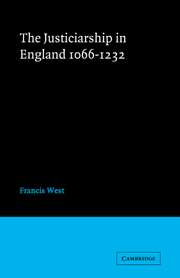Book contents
- Frontmatter
- Contents
- List of Abbreviations
- Introduction
- I THE ORIGINS OF THE JUSTICIARSHIP
- II THE JUSTICIARSHIP UNDER HENRY II
- III THE JUSTICIARSHIP UNDER RICHARD I
- IV THE JUSTICIARSHIP UNDER JOHN: BEFORE THE LOSS OF NORMANDY
- V THE JUSTICIARSHIP UNDER JOHN: AFTER THE LOSS OF NORMANDY
- VI THE JUSTICIARSHIP IN JOHN'S LAST YEARS
- VII THE JUSTICIARSHIP UNDER HENRY III
- Bibliography
- Index
VI - THE JUSTICIARSHIP IN JOHN'S LAST YEARS
Published online by Cambridge University Press: 08 January 2010
- Frontmatter
- Contents
- List of Abbreviations
- Introduction
- I THE ORIGINS OF THE JUSTICIARSHIP
- II THE JUSTICIARSHIP UNDER HENRY II
- III THE JUSTICIARSHIP UNDER RICHARD I
- IV THE JUSTICIARSHIP UNDER JOHN: BEFORE THE LOSS OF NORMANDY
- V THE JUSTICIARSHIP UNDER JOHN: AFTER THE LOSS OF NORMANDY
- VI THE JUSTICIARSHIP IN JOHN'S LAST YEARS
- VII THE JUSTICIARSHIP UNDER HENRY III
- Bibliography
- Index
Summary
The death of Geoffrey fitz Peter in October 1213 marks another turning point in the reign of King John. Probably his death had little effect upon the king's relations with his barons. Geoffrey, it is true, was a great magnate, and it might have been expected that by holding the highest office within the royal administration he would have bridged the widening gulf between the king and other members of his own class and, that when he died, other magnates would have less confidence in royal government than they had while a great baron was at its head. Such a view is too superficial. The king's opponents among the baronage were only a section of it, and in many cases their relations with the king had been bad long before Geoffrey's death. The barons were not united as a class, they were divided among themselves, and it is unlikely that the character of the justiciar could have reconciled them either to each other or to the king. If William Marshal and his son found themselves on different sides there is no reason to believe that Geoffrey fitz Peter could have persuaded men with whom he had no such ties of blood. The judgement that his death removed one of the last links between king and baronage really rests upon too high an assessment of the justiciar's influence, which in turn depends primarily upon Wendover's account of John's reaction to Geoffrey's death. Wendover, however, is no reliable authority; there is no corroborative evidence that Geoffrey influenced or controlled policy against the king's will, and a good deal of information which shows that he was a loyal servant.
- Type
- Chapter
- Information
- Justiceship England 1066–1232 , pp. 178 - 211Publisher: Cambridge University PressPrint publication year: 1966

